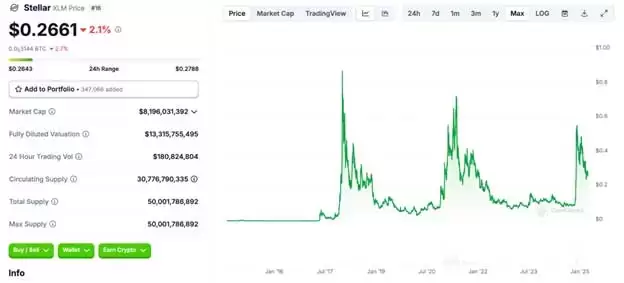 |
|
 |
|
 |
|
 |
|
 |
|
 |
|
 |
|
 |
|
 |
|
 |
|
 |
|
 |
|
 |
|
 |
|
 |
|
Cryptocurrency News Articles
Monero (XMR) Loses Its Grip as Liquidity and Accessibility Challenges Drive Darknet Markets Back to Bitcoin (BTC)
Apr 01, 2025 at 11:20 pm
The clandestine world of darknet markets, a shadowy realm of illicit commerce hidden within encrypted networks, is undergoing a significant transformation

Clandestine world of darknet markets, a shadowy realm of illicit commerce hidden within encrypted networks, is undergoing a significant transformation in its preferred cryptocurrency.
Once the darling of privacy-conscious vendors and buyers, Monero (XMR) is losing its grip as liquidity and accessibility challenges, exacerbated by major exchange delistings, are driving darknet markets back into the arms of Bitcoin (BTC).
This shift, according to Eric Jardine, cybercrime research lead at Chainalysis, reflects a fundamental principle of economics: liquidity and accessibility reign supreme.
“After major exchanges delisted XMR, we observed a larger increase in bitcoin inflows. Less accessibility is steering users back toward bitcoin,” Jardine revealed in an interview with CoinDesk.
The narrative surrounding darknet market cryptocurrency usage has changed dramatically in recent years. Many Western markets, seeking to enhance anonymity and evade law enforcement scrutiny, had transitioned to Monero, either exclusively or in parallel with Bitcoin. Monero’s inherent privacy features, designed to obfuscate transaction details, made it an attractive alternative for illicit activities.
However, the tide has turned.
The catalyst for this shift lies in the decision of major cryptocurrency exchanges to delist Monero and other privacy-focused tokens. OKX, a prominent exchange, removed XMR, Dash (DASH) and ZCash (ZCH) from its platform in late 2023, citing regulatory concerns and evolving compliance standards.
Binance, the world’s largest cryptocurrency exchange by trading volume, followed suit in February 2024, announcing its intention to delist Monero.
“When a coin or token no longer meets this standard, or the industry changes, we conduct a more in-depth review and potentially delist it,” Binance stated, highlighting the growing regulatory pressures surrounding privacy-focused cryptocurrencies.
The impact of these delistings is evident in on-chain data. BitInfoCharts reveals a stark decline in daily Monero transactions, which have nearly halved compared to the same period last year. This decline in transaction volume highlights the liquidity challenges facing Monero as its overall accessibility lessens.
“In order to be an effective kind of medium of exchange, you need a certain amount of liquidity and a certain amount of accessibility,” Jardine emphasized, highlighting the fundamental requirements for any cryptocurrency to function as a viable medium of exchange.
The Paradox of Privacy: Liquidity vs. Anonymity
The resurgence of Bitcoin in darknet markets highlights the tension between privacy and liquidity. While Monero offers enhanced anonymity features, its reduced accessibility and liquidity have diminished its appeal as a medium of exchange.
Bitcoin, despite its transparent blockchain, remains the dominant cryptocurrency, boasting unparalleled liquidity and widespread acceptance. This makes it the preferred cryptocurrency for darknet market vendors who need to quickly and easily convert their earnings.
This shift highlights a fundamental challenge for privacy-focused cryptocurrencies: achieving widespread adoption while maintaining robust anonymity features. The regulatory pressures and exchange delistings have created a paradoxical situation, where privacy coins are struggling to gain the same level of adoption as Bitcoin.
The Broader Context: Illicit Cryptocurrency Activity and Law Enforcement Scrutiny
While the shift in darknet market cryptocurrency usage is noteworthy, it’s crucial to contextualize illicit cryptocurrency activity within the broader crypto landscape. Jardine emphasizes that illicit transactions represent a minuscule fraction of total crypto activity.
“Typically, we see illicit transactions at or below 1% of total crypto activities,” Jardine stated. “Addressing these issues is important, but broadly labeling crypto negatively is inaccurate and unproductive.”
Chainalysis data corroborates this assertion, indicating that approximately 0.14% of all cryptocurrency transactions, amounting to roughly $50 billion, involve illicit activity. This data underscores the fact that the vast majority of cryptocurrency transactions are legitimate and contribute to the growth of the digital asset ecosystem.
However, law enforcement agencies remain vigilant in their efforts to combat illicit cryptocurrency activity, particularly in the context of darknet markets. Jardine notes that authorities prioritize these markets based on their scale and involvement in the fentanyl trade.
The fentanyl trade, a scourge on global health, has become a focal point for international law enforcement. Darknet markets that facilitate the sale of fentanyl or its precursor chemicals are subject to heightened scrutiny and targeted enforcement actions.
“Markets have sort of varying levels of sensitivity to fentanyl-related sales,” Jardine explained. “Some claim they don’t do it, then don’t police vendors; some claim they don’t do it, but then they do. Some will be selling precursor products but not finished products.”
The recent takedown of the Nemesis online market by U.S. law enforcement highlights the heightened focus on fentanyl-related darknet activity. The U.S. Department of the Treasury’s Office of Foreign Assets Control (OFAC) specifically cited the market’s role in the fentanyl trade as a reason for its designation.
The Stablecoin Surge: A New Frontier for Illicit Transactions
In addition to Bitcoin,
Disclaimer:info@kdj.com
The information provided is not trading advice. kdj.com does not assume any responsibility for any investments made based on the information provided in this article. Cryptocurrencies are highly volatile and it is highly recommended that you invest with caution after thorough research!
If you believe that the content used on this website infringes your copyright, please contact us immediately (info@kdj.com) and we will delete it promptly.





























































